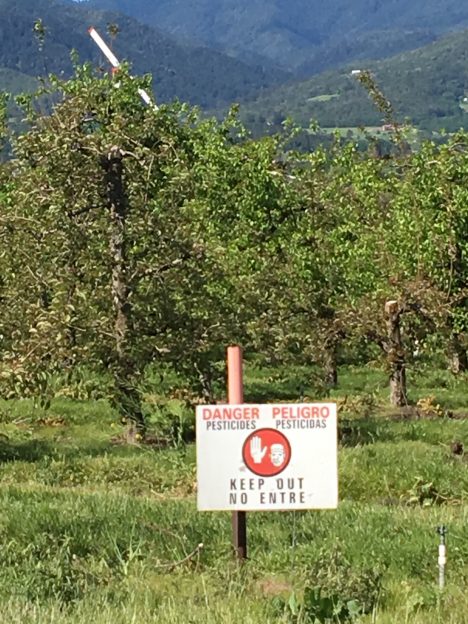In January of 2016, MRG launched the Capacity Building Initiative (CBI). The CBI provides multi-year funding, individualized technical assistance, and peer learning opportunities to ten grassroots social change organizations across the state. Our pilot project is currently being funded in partnership with Meyer Memorial Trust.
Oregon has over 300 registered farm worker housing camps and another 200 unregistered camps. Most of these camps are located within orchards and fields that are regularly sprayed with carcinogens and neurotoxins. In order to protect the health of farmworkers, federal law requires a minimum 100 ft. no-spray buffer for all housing. This soon might not be the case in Oregon.
You may be surprised and dismayed to learn that Oregon’s worker protection agency, OSHA, wants to give Oregon farmers “a pass” on following the 100-ft buffer regulation. In March, during an OSHA policy meeting, Beyond Toxics learned of this potential change. We were one of only two worker advocacy groups present. I was not surprised to see that farmers, agriculture industry representatives, and OSHA employees seemed in a big hurry to get the “Oregon Compliance Alternative” option over and done with. Through this alternative, OSHA wants to replace the protective no-spray buffer with a “shelter in place” policy, which is a euphemism for farm workers to cower inside their wooden shacks while aerial and air blast pesticide sprays swirl all around them.
If Beyond Toxics had not been present we may have lost our opportunity to share a missing and essential voice, the voice of farm workers. Beyond Toxics sounded the alarm to get other groups to attend the April meeting, where Big Ag showed up and met us with more show of force. Yet, we had our partners, PCUN, Oregon’s Farm Worker Union, the Carpenters’ Union, NW Jobs with Justice and others, there with us to present a united front in support of fair and healthy working conditions. Our combined strength can make a difference.

To support the people most impacted by OSHA’s actions, Beyond Toxics teamed up with Latinos Unidos Siempre (LUS) to give a presentation at a farm worker housing complex just outside of Salem. Both LUS and Beyond Toxics are cohort members of the MRG Capacity Building Initiative. In April, we did joint outreach and training to farm workers and their families around pesticides and health. We also thought this would give us the opportunity to recruit farmworkers to share their experiences and stories at the OSHA rulemaking meetings.
During the training, I met a farm worker who we will call Rosa, not her real name. I asked about her concerns a farm worker. Her first complaint was about not having access to a bathroom. She also told me she is regularly exposed to pesticides on her skin, and breathes in the fumes while working in the fields. I asked her if she wore gloves. She said the farm owner at a strawberry patch didn’t allow her to use gloves and threatened firing if she did. I asked Rosa if I could record her comments so we could present her testimony to OSHA, but she wasn’t prepared to do that. She is shy, and like many other in her community, silenced by fear. Rosa’s story is all too common.
Those of us who are workers’ rights activists know these stories well. These workers and their experiences are not a figment of our imaginations, although industry would have you think so. It’s clear that these stories are not reaching the people at the top who make the rules. Right now, in the Age of Trump, the backbone of federal worker protection standards may be unraveled. All signs point to the very real possibility that we may lose the opportunity to ensure a safe and healthy work environment for our workers. How do we combat hopelessness? How do we battle the mindset that the current situation must be accepted because it is simply business as usual? Most importantly, how do we make sure our migrant farm workers are not exploited or fired just by asking for minimal protections to protect their health?
It’s only a matter of time before OSHA buckles under the pressure of Big Ag bullying. We are working to support farm workers in testifying to help us make the case that, as a minimum, Oregon must adopt federal standards. But farm workers everywhere are gripped by fear because of our country’s more aggressive attacks on migrants. “We are very busy just keeping families together,” they say.
Beyond Toxics will push forward and be present and vocal at all the OSHA meetings. We will be there to defend workers’ rights, to be a watchdog for policy development and be prepared to file formal complaints if farm workers continue to be treated as modern-day slave labor.
What can you do? If you are an expert in the areas of agriculture, work place safety, organic farming and/or you are a doctor with knowledge of the long term effects of pesticide exposure, please contact us at Beyond Toxics. We need your knowledge and expertise.






Great program and article Mysti !
This is such important work Mysti Frost and Beyond Toxics is doing. We are sure its business as usual as corporate agro and politics avoid regulations that do not benefit their agendas.
Blow that whistle loud and strong. remember Dolores Huerta of California.